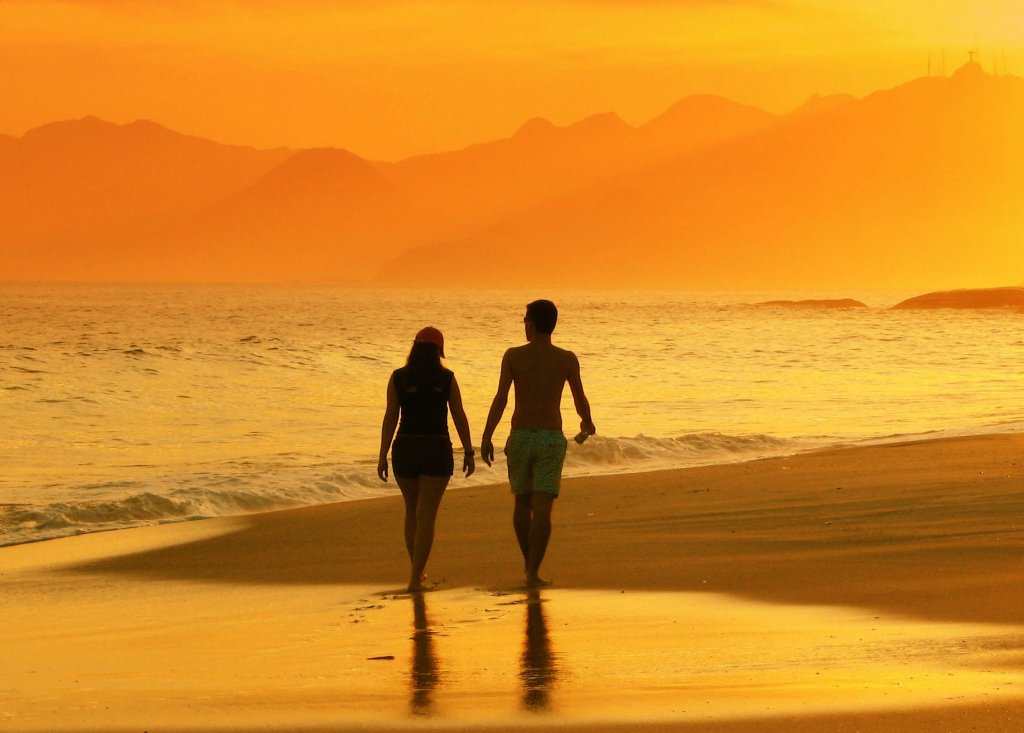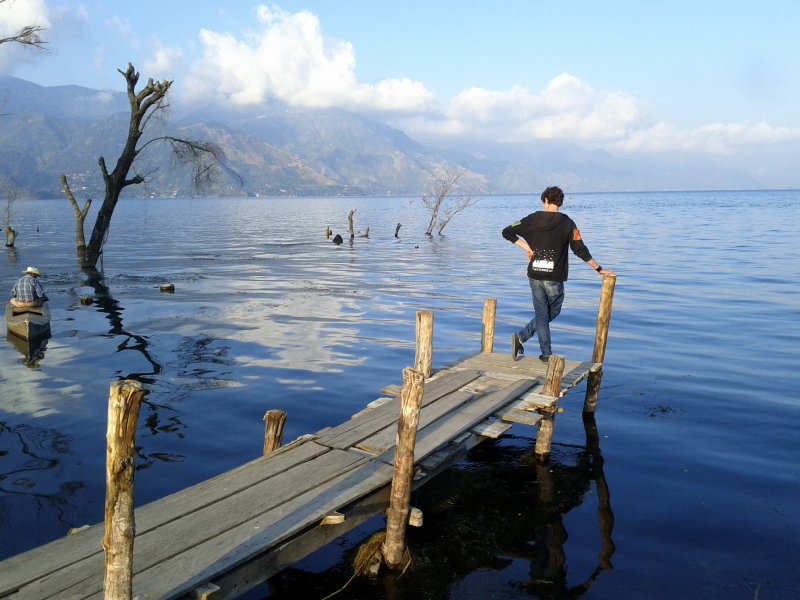One of the more challenging aspects of living a free life is knowing how to go about being successful in all you do – working, travelling, and living your life every day. I would argue that relationships are the keystone to a successful Digital Nomad lifestyle. Connecting to people every day in some meaningful way is necessary to both your ability to function and to be happy.
Some scenarios to illustrate:
John, a moderately successful entrepreneur, 36 years old, single, speaks only English
“I prefer to roam in better countries in the world. I might visit Italy and Greece for a couple of months this year as they are struggling financially and this means I can stay in great hotels and eat well. I am not cheap, but having worked hard to build my business and be personally free, I don’t waste money, either. I do about 10 hours of work a week managing my businesses remotely, primarily by telephone and email to my employees in Canada. It is amazing what you can see and experience when you visit Europe. Not a day goes by when I don’t run across an event, historical marvel, or a restaurant serving delicious food.”
Mary, an NGO logistics coordinator, 42 years old, in a differentiated relationship, speaks 3 languages
“My experience with the independent lifestyle is one of real freedom. I work part-time for an NGO which operates in 35 countries in the world. My speciality is in connecting people and resources to have our operations take place smoothly. This might mean preparing and guiding a group of volunteers who are providing medical care after a natural disaster, or it might mean setting up a school in a vibrant but poor community somewhere in the world. In all cases, the greatest satisfaction comes from the people I meet and work with to make the logistics happen. Sometimes I am invited to stay with families of our local contacts and end up having wonderful connections – people I now call life-long friends. Other times it is the volunteers who I have a marvellous time with. But in all cases, whether I am working or just enjoying the places I am once my work is done, it is the people that make this an amazing lifestyle.”
Prakesh, receives a good income from an online businesses, 29, single, speaks 2 languages and learning a third.

“I am a first-generation American, born and raised in New Jersey. After receiving my degree in engineering I chose to start some online learning programs for ESL learners. These now provide a nice income for me to explore the world with. I travel for about half the year, spending time in amazing places and getting to know amazing people. While I am officially single, I do meet up and travel sometimes with someone special who I met in Argentina a couple of years back – a fellow free-spirit. I know that I am not an island – relationships are important to me. In fact they are in my blood, so to speak, as my very tight-knit family is from India, originally. So besides my wonderful travel companion, I also tend to spend time in homestays, hostels, and family run hotels where I can get to know people. I give wherever I go, too, whether it is helping with some technical problem or sponsoring a student. This spirit of giving results in wonderful friendships wherever I go. I won’t always be a digital nomad. In a few years I would like to have a family and this will mean more geographic stability. But after those years, I hope my wife/partner will join me in our later years for more fun exploration of the world and connecting to wonderful people.”
A few thoughts about John, Mary, and Prakesh
Which of these people do you think will be the most successful in the long-term as a Digital Nomad?
I would argue that Prakesh has the best chance of having the best experience. Why? Because he strives for balance, knows that nothing lasts forever – including where he is in his life stage right now, and knows that people and relationship are a foundation to his success, including a clear relationship with himself.
Mary will also have a successful time, seeing relationships as both a cornerstone of her success in her job and as a fulfilling part of her life. However, do you see that Mary does not have as well-rounded a perspective, perhaps, as Prakesh?
Finally, I would suggest that John’s archetype, the lone ranger, while a nice romantic vision, is not sustainable emotionally or logistically. He is enjoying the rewards for his hard work as an entrepreneur, but does not have a well-rounded understanding of himself, his life path, how to connect to the world (one language, a tourist approach to travel), and is missing the key ingredient: People. Being a lone ranger is not a sustainable mode for being a Digital Nomad.
Relationship principles for a Digital Nomad lifestyle
The following are some human relationship principles I would suggest can serve you well as you go about creating your ideal roaming lifestyle:
1. You are not an island.
Daily meaningful interactions with people are essential to your mental and emotional well-being. If you come from a family or social sphere where distant connection, high personal boundaries, and much privacy is the norm, then moving towards closer connections with people you meet might be a bit of a cultural challenge for you. Or it might not find it hard: You may find that you have been starved all your life of the kind of connections that feed your soul and will be a social bunny rabbit when you find yourself in more relationship oriented countries. In either case, prepare now to be more socially connected in a Digital Nomad lifestyle.
Tips to help the transition:
– Learn more than one language so that connecting with people other than fellow travellers is doable. If you plan on spending a lot of time in Europe, French and/or Spanish would be good bets. If Central or South America is on your radar, Spanish is essential. Asia? Tougher to learn a second language, possible and recommended if you plan to return many times and for many years. Some people visit Japan, for example, and 5 years later they find themselves both fluent and surprised that they stayed so long.
– Ease into closer connections. Start by travelling with a friend. This will buffer the raw shock of connecting so quickly and closely with people in the countries you visit. When you stay in hostels or hotels, try shared bathrooms instead of private. This will help you feel less self-conscious as you internalize the reality that you are not alone in having to share space and facilities and your toileting and cleaning processes are just the same as everyone else’s…and no-one is watching you.
– Eat at a mix of local and expatriate restaurants and be OK with it. Purist travellers insist on eating only at local cuisine restaurants and sneer at “tourists” who eat expatriate food. Don’t waste a second listening to them. Ease into local foods and restaurants gently. Like personal hygiene, food is a very special part of our grounding and connecting. Eating at restaurants run by expatriates and serving food that you are familiar with is a great starting point. And you will naturally run into others from your culture who you can connect to. Often a group will be heading out to dinner at a local restaurant and you can join them – again having a buffer to start getting used to connecting with unfamiliar foods, restaurant processes, and peoples.
Learning to make rich connections with people wherever you go is not something that happens easy for some people. If you fit this personality then go easy on yourself. What we are talking about here is not becoming an extroverted party animal, but rather to be open to connecting authentically and naturally with people in any culture and place, something that everyone can learn how to do.
2. Most the world is relational.
Only a few countries – led by the U.S. – espouse individualism and independence very highly. To get things done in the rest of the world, people and relationships are key.
Here is an example of how it works:
Lev, an Israeli-American visiting Guatemala for the first time, saw a wildlife park in a guide book and decided to visit it immediately. He read about the route by bus in the same book, found his way to the bus stop on his own, paid, and rode 1-1/2 hours by bus to the park. Upon arrival he found out the park was closed that day, something he didn’t read in the guidebook as it was currently off-season and the park wasn’t open 7 days a week.
“Why didn’t someone tell me?” Lev said to me in exasperation when relating his tale. “I wasted 3 hours on the bus!”
Do you see what happened? In North America, we are used to using guidebooks and the internet to figure everything out – we independently take initiative to help ourselves make things happen. We have learned that we can do thing faster and with fewer interpersonal slow-downs if we take control and do it ourselves.

And there is no problem with this way of doing things…in North America and much of Europe. Systems are designed to work well for independent action. As most people know, trying to phone a chain store to confirm if they are open, for example, is exasperating: Phone self-serve menus are designed to give you everything they think you need…except being able to talk to a live person.
Most of the rest of the world is set up with the expectation that people will naturally be the system you use to get things done. Everyone expects you will ask for help and they are quite willing to help you. Of course, if they need help, they will expect you to help them as well, something that can make those from highly individualistic and independent culture squeamish!
Result?
To get things done in most of the world, ask people about most things. Get to know them a bit and they will help you. Offer to help them with something and they will go out of their way to ensure you get what you need done and make sure you know the best and safest way to do things.
Go back to Lev’s situation. Notice that he didn’t actually talk to anyone?
Interesting insight and useful tip?
Aural and vocalizing (hearing and speaking) are central to the relationship orientation. As I was taking a local inter-city bus in Guatemala, I noticed that there were two people running the bus – the driver, and the “caller”. The driver managed the chaos called driving in the country. The caller, on the other hand, leaned out of the bus door and loudly called the destination of the bus as it came to various stops. Yes, the country has a high illiteracy rate, but the destination was boldly and clearly written on the front and even if you are illiterate, you would probably be able to learn basic patterns of words such as city names.
Then the bus came to a stop and as the caller shouted the destination, two people who were talking to each other jumped up and ran to the bus. They were not waiting at the stop looking down the street for the bus (a process orientation). They were not lined up the stop to be first on the bus (a goal orientation). Instead, they were were sitting talking to each other, and when they heard the caller, they got on the bus. They were relating to each other first and foremost.
This may seem a simple example, but it underscores how life is in a relational culture – you are in connection to one another and people connect vocally (the bus “caller” in this case) to let you know when you need to take action.
Tip: Get used to relationships and how they work before travelling in highly relational cultures, particularly. And get used to asking and listening more than trying to figure it all out yourself. You will avoid a lot of mistakes, frustration, and irritation.
Being relational is just how most of the world works.
3. You will change…and so will your relationship needs
You don’t become a Digital Nomad and stay that way for life. It is not a lifelong profession or spiritual philosophy. It is only a lifestyle, albeit a pretty awesome one.
What happens when you enter a different life stage and context, triggered by one a number of possible situations?
- You enter a relationship that you feel will lead to starting a family or some deep inter-personal learning together.
- You find a place you feel incredibly at home in.
- You connect to a group of people doing something in one place – you find your tribe.
- Your aging parents need more support.
- You join an organization that needs you to be in one place.
- You feel you would like to be more grounded in natural rhythms such as growing your own food.

I have seen many people try to brave on with their Digital Nomad lifestyle even when their life is changing and it is time to put the travel guides on the bookshelf for awhile. In most cases, when your life changes significantly, digital nomading simply doesn’t work any more. It doesn’t work for a while, or even for a very long time. A high need baby, for example, doesn’t dovetail nicely with your taking a red-eye flight to Bangkok for some late night bar-hopping with friends. It simply doesn’t work.
The biggest relationship shift seems to be one of moving from a very free flowing mode with few relationship responsibilities to one of commitment to a relationship which requires your consistent presence. This can be a new love relationship, the arrival of a baby, the illness of a family member or parent, or even, in one memorable example, where someone with a terminal disease asked a close friend to stay to be with him when he dies. All powerful reasons to unpack the laptop and toiletries bag for awhile.
Understanding that the nature of your relationships with others will evolve over time and your relationship to yourself, too, is essential to living the Digital Nomad lifestyle happily and successfully right now.
‘”Carpe diem” – “seize the day”. Tomorrow will be different. And that is OK.
